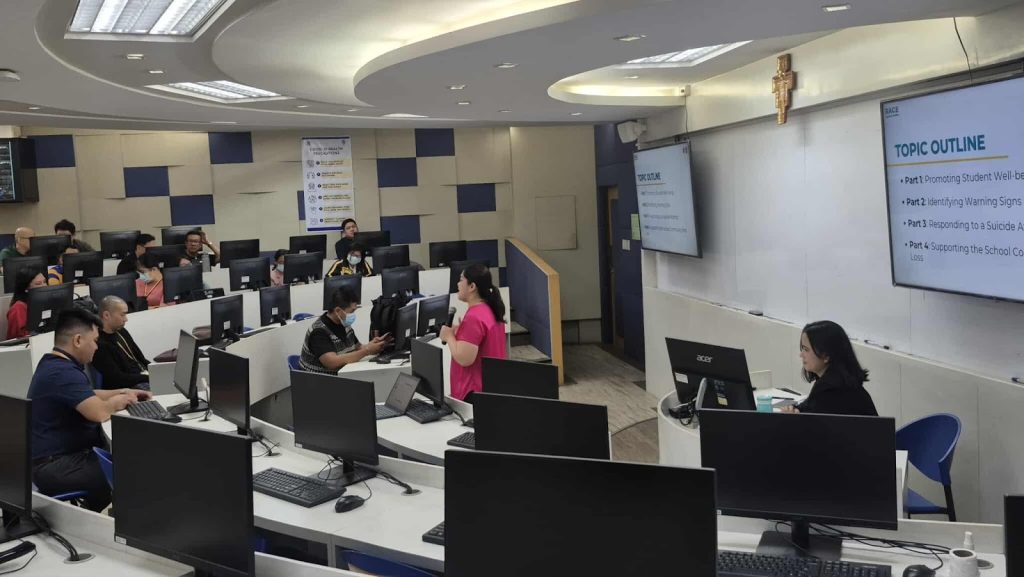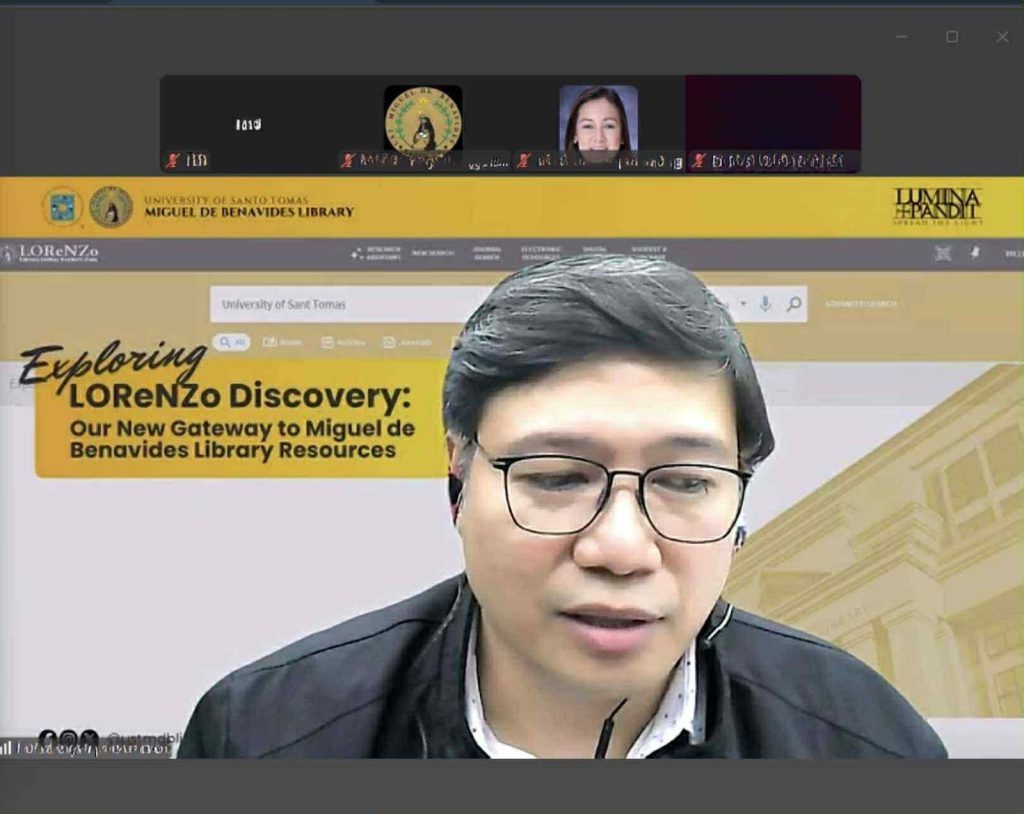
The Institutional Faculty Training Program was held last August 4, 2025, from 8:30 AM to 4:00 PM via Zoom Events. This term’s training program introduced the Institutional Standards of Professional Ethics (IPSE) for UST Academic Staff, providing a comprehensive ethical framework that guides the conduct of Thomasian educators in alignment with the University’s Catholic Identity.
This is organized by the Office of the Vice-Rector for Academic Affairs, in collaboration with the Center for Innovative Teaching and Educational Delivery, and the Educational Technology Center.
Training Outcomes:
- Gain fundamental knowledge about foundational ethical principles and professional conduct, which may be applied in the performance of various tasks.
- Gain fundamental knowledge about ethical principles that may be applied to tasks and activities related to academic staff competence and responsibilities.
- Gain fundamental knowledge about ethical principles that may be applied to tasks and activities related to external engagement, representation, and research.
- Gain fundamental knowledge about ethical principles that may be applied to tasks and activities related to recognition, advancement, and resource use.
Keynote Speaker
Rev. Fr. Louie R. Coronel, OP, EHL (Being a Catholic, Dominican, Thomasian Educator: A Gift and a Responsibility).

Session 1: Foundational Ethical Principles and Conduct
This session intends to reorient the academic staff to our unique core values and nature that set us apart from other educators. While there may be continuous retooling on innovative and emerging pedagogical and technological approaches that would make us abreast with the times, there are ethical principles that must be deliberately articulated, shaping our roles as Catholic educators, professionals, and members of a community. Acknowledging these factors would make us more conscientious of our actions and more grounded in our Catholic and Dominican nature.
Resource Person: Assoc. Prof. Pilar I. Romero, PhD Panelists: Assoc. Prof. Pilar I. Romero, PhD, Rev. Fr. Ferdinand L. Bautista, OP, PhD, Sr. Lib. Maria Cecilia D. Lobo, RL, MLIS, Asst. Prof. Maria Cristina A. Maranion, MD, and Prof. Evelyn A. Songco, PhD
Session 2: Academic Staff Competence and Responsibilities

This session focuses on the ethical principles influencing the primordial tasks of the academic staff to teach and to extend support services in aid of optimal instruction. While the University wholly acknowledges the vital role of academic freedom to elevate the quality of discourses and learning opportunities, we need to be consistent with being aligned with institutional and Catholic norms, policies, and objectives. All efforts should be exhausted to ensure that moral uprightness is inextricably bound with our day-to-day functions from our initial appointment to retirement.
Resource Person: Prof. Cheryl R. Peralta, DrPH

Panelists: Prof. Cheryl R. Peralta, DrPH, Prof. Al Faithrich C. Navarrete, PhD, Asst. Prof. April Joy M. Gascon, RN, MAN, and Sr. Counselor Janice T. Ocray, RGC, MA This session aims to reiterate the crucial role of Thomasian educators in generating and disseminating knowledge bound by scientific and ethical rigor. Our participation in research-related tasks advances our individual professions and impacts the services we provide to our stakeholders. While collaboration with various parties is inevitable to reach this endeavor, we need to be constantly reminded that all our thoughts, motives, actions, and expressions mirror the name and interests of the University.
Resource Person: Prof. Florence C. Navidad, EdD, RMT, RN
Panelists: Prof. Florence C. Navidad, EdD, RMT, RN, Prof. Joel C. Sagut, PhD, Prof. Jeremiah M. Opiniano, PhD, Prof. Angelo R. dela Cruz, PhD, and Prof. Gezzez Giezi G. Granado, DCL
Session 4: Recognition, Advancement, and Resource Use

This session highlights the primary responsibility of academic staff to continuously participate in professional development activities in our pursuit of seeking and imparting truth, contextualized in our disciplines and fields of interest. While the University promotes and fully supports the development and advancement of academic staff, it is incumbent that prudence and honesty are valued whenever we select and participate in these activities, giving utmost emphasis to the benefit that our stakeholders will gain in the process. Equally important is the ethical use of University facilities and resources. As stewards of these shared assets, we are expected to demonstrate respect, transparency, and accountability in how we use them. Valuing what is provided to us means practicing modesty and gratitude, particularly when our contributions are acknowledged. In all aspects of our academic work, we are called to model ethical conduct that honors both our profession and the institution we serve.
Resource Person: Prof. Ma. Carlota B. Decena, PhD
Panelists: Prof. Ma. Carlota B. Decena, PhD, Prof. Rey Donne S. Papa, PhD, Prof. Melanie D. Turingan, PhD, Rev. Fr. Dexter A. Austria, SThD, and Asst. Prof. Fermin Antonio D.R. Yabut, PhD
Aside from the Institutional Faculty Training Program, other learning sessions were likewise offered to prepare the academic staff for the First Term of AY 2025-2026.
Unit-Level Pedagogy-Driven and Technology-Focused Mentoring Sessions
These sessions are intended to facilitate a structured review and improvement of the course plans and course sites to be used for the First Term AY 2025-2026. These also provide a contextualized application of pedagogical and technological concepts specific to the needs of the academic unit. Five modules were offered, namely: Outcomes and Content, Teaching-Learning Activities, Assessment Tasks, Technology Tools, and Learner Support. These sessions are facilitated by the Pedagogical Lead and eLearning Specialists of each academic unit. These sessions are offered from July 21 to August 31, 2025, per academic unit.

RACE Against Suicide
This program, which is facilitated by the Counseling and Career Center, seeks to train the academic staff and administrators to become effective gatekeepers in the school setting to prevent suicide within the community through appropriate identification, management, and referral of learners-at-risk. Guidance counselors held an on-site learning session per academic unit last August 1, 2025.


Orientation to LORENZO Discovery
The UST Miguel de Benavides Library offered a series of online orientations for academic staff on the use of the Lorenzo Discovery search platform. This took place from August 11 to 15, 2025.



